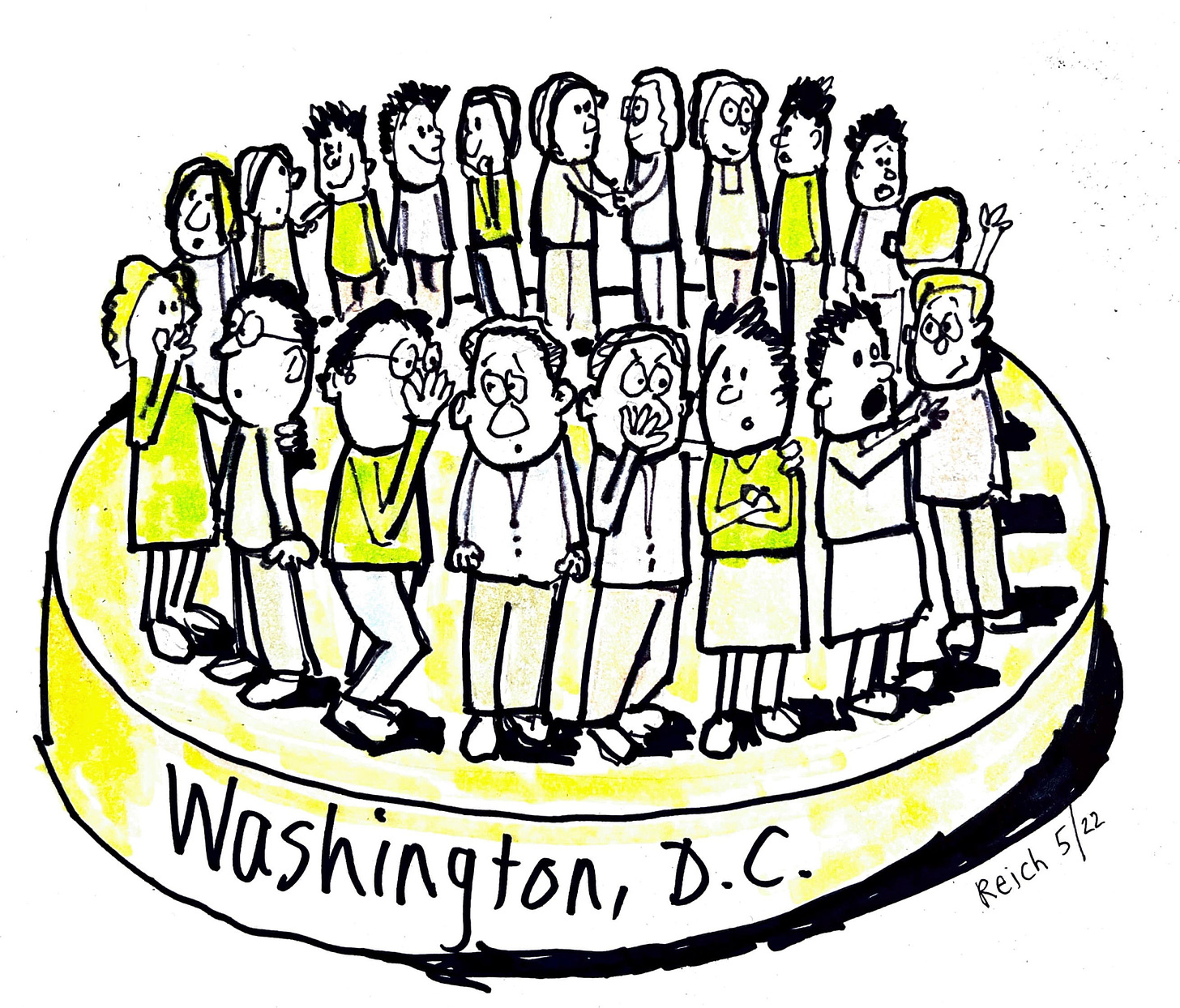Hello friends. I hope you’re reasonably well, under the circumstances. Today I want to talk to you about leaks. I’ve had a lot of experience with them. I spent almost half my adult life in Washington.
Justice Samuel Alito’s first draft opinion overturning Roe v. Wade — which was leaked to Politico — was dated February 10. It is probably obsolete by now, as other justices have had time to offer critiques, dissents, and revisions. But according to another leak from the Supreme Court — this one occurring last week — the five-member majority to overturn Roe remains intact. (This second leak came to the Washington Post from “three conservatives close to the court who, like others, spoke on the condition of anonymity to discuss a sensitive matter.”)
These Supreme Court leaks aren’t the only ones shaking official Washington right now. Last Wednesday the New York Times — citing “senior American officials” — disclosed that the United States is providing Ukrainian officials with locational details of Russian movements that Ukrainians have used to target and kill Russian generals. Then on Thursday, NBC reported — again citing American “officials” — that U.S. intelligence helped Ukraine locate the Moskva, Russia’s flagship in the Black Sea, which Ukraine subsequently sank.
President Biden was so livid about these leaks (according to Times columnist Tom Friedman, who received a leak about Biden’s reaction to the leaks) that Biden called the director of national intelligence, the director of the C.I.A. and the secretary of defense to make clear in the “strongest and most colorful language” that this kind of loose talk is reckless and has got to stop immediately, before the U.S. ends up in an unintended war with Russia.
Supreme Court drafts don’t normally leak (insiders tell me the Alito draft isn’t the first, though) because the stakes aren’t normally as high as they are with the Court’s decision to abandon Roe. The machinations of American foreign policy do tend to leak quite a lot. Richard Nixon’s Watergate “plumbers” were, after all, trying to discover who leaked the Pentagon Papers to the New York Times. (Nixon couldn’t plug the leaks. Every time he tried, they grew leakier. They ultimately drove him out of office.)
Years ago, when I was Secretary of Labor, I sent a memo marked “confidential” to Bill Clinton, about why and how the minimum wage should be raised. I took pains to make sure only his eyes saw the memo. The next day it was in the Wall Street Journal.
People in power always want to plug up leaks. I felt that way when I saw my memo in the Journal. But the goal is often misguided. In my experience, people in power pay too little attention to why they want to withhold information in the first place. Much of it stems from not wanting to be embarrassed. (I didn’t want my minimum-wage memo publicized because I didn’t want to embarrass Clinton, or embarrass myself by looking like I was trying to pressure Clinton.)
Besides, most leaks can’t be plugged up.
Some people in Washington leak information to the media to make themselves feel important. Others, to kill initiatives they don’t like. Others, to fuel initiatives they want. A few (journalists, spies, inside traders) make money by buying and selling leaks.
But the biggest reason Washington is so leaky has to do with the way the city is organized. Washington is a one-company town. Just about everyone who works in the upper reaches of government has a spouse, best friend, or lover who works in another part of the upper reaches of government, or in a firm that’s lobbying the government, or in the media that’s reporting on the government. In a one-company town like this, personal intimacies are indistinguishable from public gossip. Everyone knows someone extremely well who knows someone else extremely well who knows someone who has a delicious secret.
Every city has its public gossip — the juiciest tidbits of which no one else yet knows but everyone will be talking about as soon as the tidbits are circulated. In Boston, it’s about sports and coaches. In San Francisco, it’s restaurants and chefs. In New York, it’s money and insider financial deals.
In Washington, it’s politics and power. Possessing and leaking confidential political information confirms that the leaker has power. And in leaking the information, the leaker confers some of that power on the leakee. Leaks thereby move swiftly from one dear ear to the next — shared over breakfast, brunch, lunch, coffee, cocktails, receptions, dinners, late drinks, wee-hour assignations, early-hour get-togethers, early coffees — all in a slightly lowered voice or a behind-the-hand whisper, typically with a knowing smirk. These conversations and handoffs cement personal relationships in the nation’s capital.
When it comes to secrets, the size of a city depends not on the number of people inhabiting it but on the velocity with which secrets flow. By this measure, Washington D.C. is one of America’s tiniest villages with a main street running about a block. Every juicy secret will get out. Every hot memorandum will leak. Every intoxicating paper marked “confidential” will leak even faster.






















Share this post